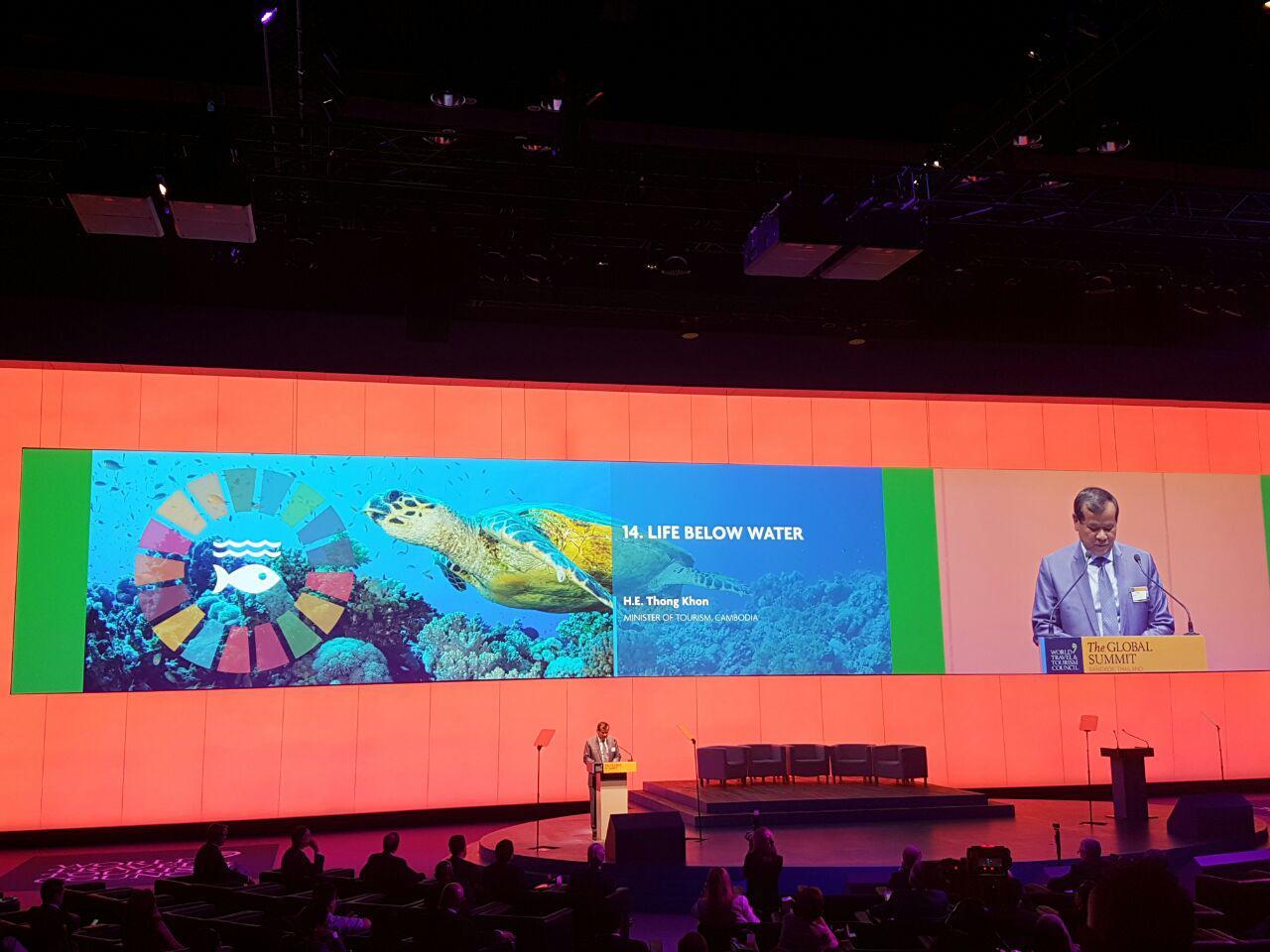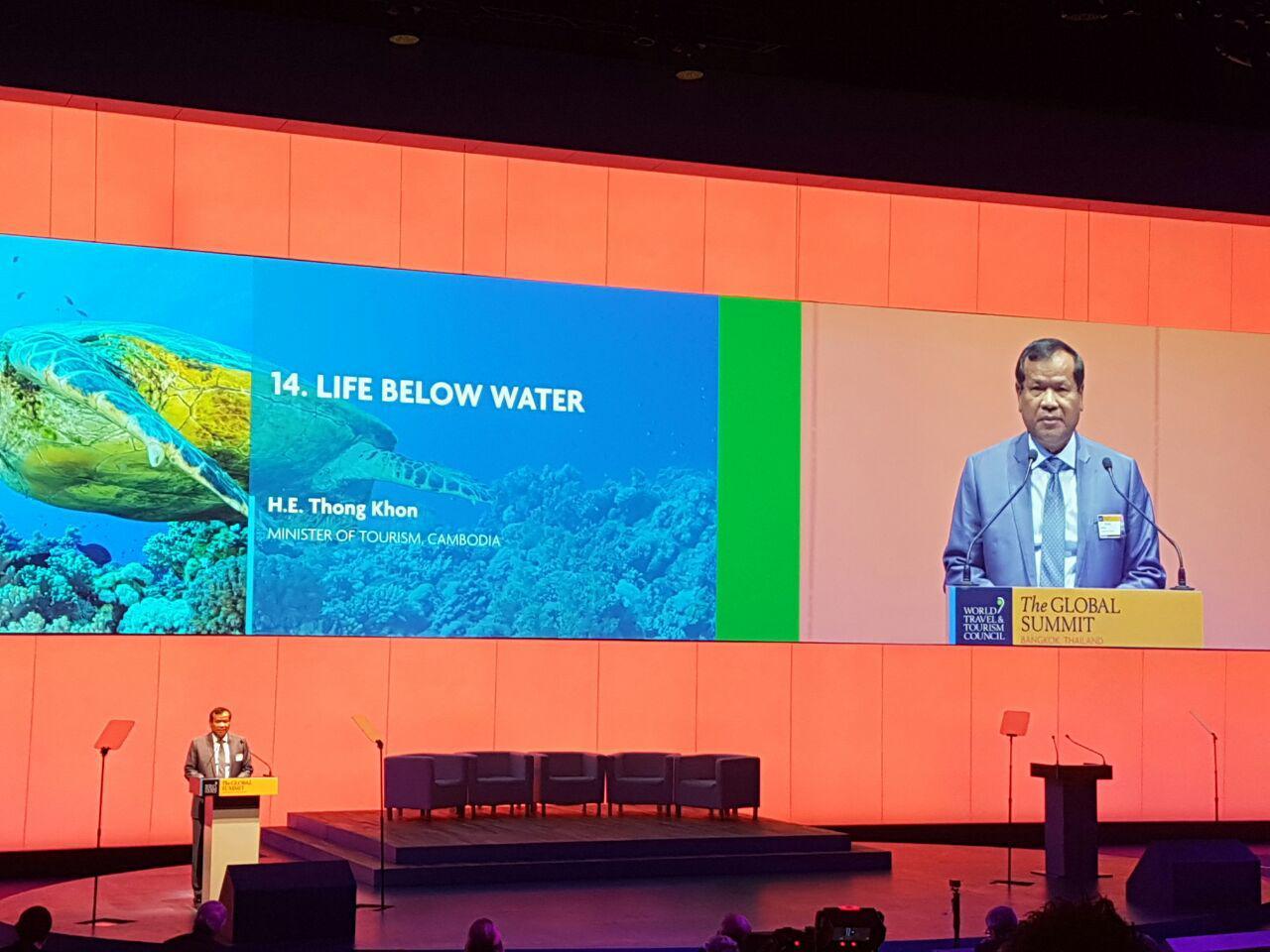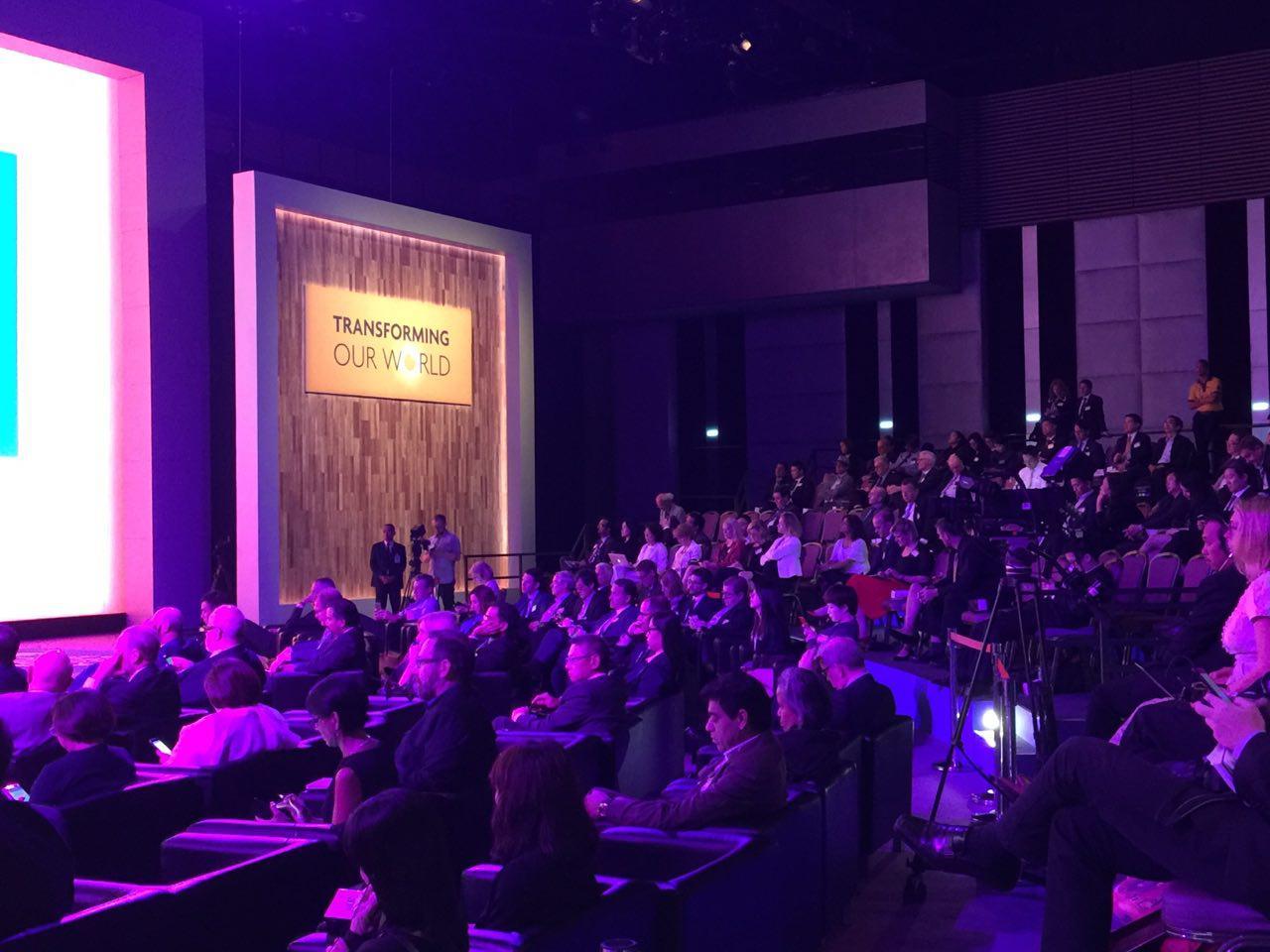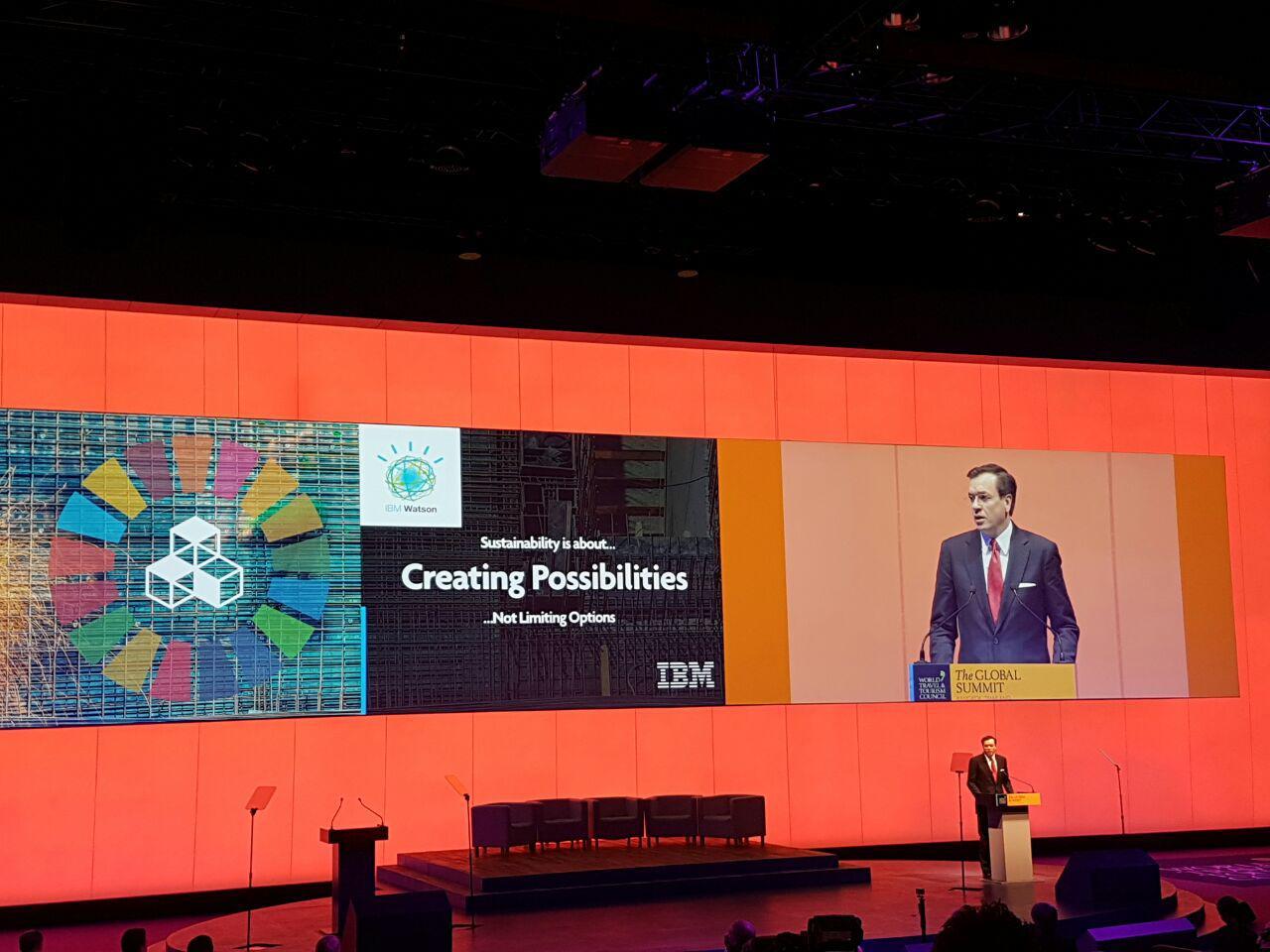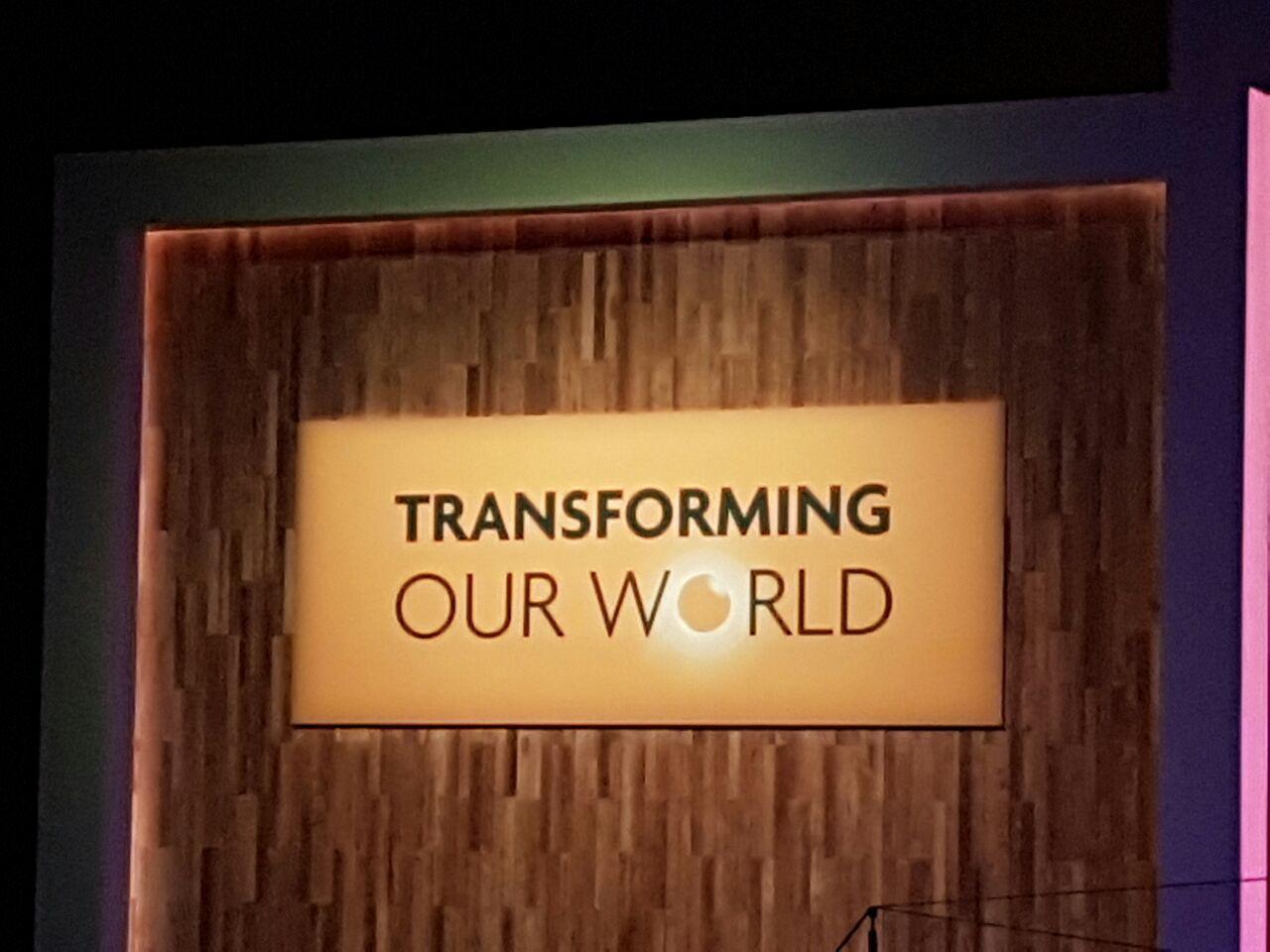(បាងកក)៖ បន្ទាប់ពីបានចូលរួមកិច្ចប្រជុំទ្វេភាគីថ្នាក់រដ្ឋមន្រ្តីទេសចរណ៍កម្ពុជា-ថៃ តាមការអញ្ជើញរបស់ប្រធានក្រុមប្រឹក្សាទេសចរណ៍ និងធ្វើដំណើរពិភពលោក (World Tourism and Travel Council) លោកបណ្ឌិត ថោង ខុន ក៏បានដឹកនាំគណៈប្រតិភូចូលរួមសន្និសីទពិភពលោក លើកទី១៧ របស់ក្រុមប្រឹក្សានេះ ក្រោមប្រធានបទ «ការផ្លាស់ប្តូរពិភពលោក ដើម្បីអនាគតប្រកបដោយចីរភាព (Transforming our World for a Sustainable Future)» ស្របពេលដែលអង្គការសហប្រជាជាតិ បានកំណត់ថា ឆ្នាំ២០១៧ ជាឆ្នាំអន្តរជាតិនៃទេសចរណ៍ ប្រកបដោយនិរន្តរភាព សម្រាប់ការអភិវឌ្ឍ (2017: International Year of Sustainable Tourism for Development)។
នៅក្នុងសន្និសីទដ៏សំខាន់នេះលោកបណ្ឌិតរដ្ឋមន្រ្តី ត្រូវបានផ្តល់កិត្តិយសអញ្ជើញ ជាវាគ្មិនថ្លែងបថកថា អំពីការអភិវឌ្ឍវិស័យអេកូទេសចរណ៍នៅកម្ពុជា ដែលជាគន្លឹះនៃការអភិវឌ្ឍ ប្រកបដោយនិរន្តរភាព (Ecotourism: the Key for Sustainable Development)។
លោកបណ្ឌិតបានចែករំលែកនូវបទពិសោធន៍សំខាន់ៗ ជូនអង្គសន្និសីទអំពីការអភិវឌ្ឍសហគមន៍អេកូទេសចរណ៍ ការរួមចំណែករបស់អេកូទេសចរណ៍ ក្នុងការការពារ អភិរក្ស ថែរក្សាបរិស្ថាន ការលើកកម្ពស់ជីវរស់នៅរបស់ប្រជាជនសហគមន៍ កាត់បន្ថយចំណាកស្រុក និងការប្រែក្លាយអតីតអ្នកប្រមាញ់សត្វព្រៃ ជាអ្នកដឹកនាំសហគមន៍ និងអ្នកកាប់ឈើជាអ្នកផ្តល់សេវាអេកូទេសចរណ៍ ជូនភ្ញៀវទេសចរនៅសហគមន៍ជីផាត (កោះកុង) និងគំរូល្អមួយទៀតនៅសហគមន៍អេកូទេសចរណ៍កោះទ្រង់ ខេត្តក្រចេះ ដែលបានទប់ស្កាត់ និងផ្លាស់ប្តូរមុខរបរអ្នកនេសាទ ដែលបានធ្វើឲ្យប៉ះពាល់ដល់ជីវិតសត្វផ្សោត មកធ្វើជាអ្នកផ្តល់សេវាដល់ទេសចរក្នុងសហគមន៍។
លោកក៏បានបញ្ជាក់ជូនអង្គសន្និសីទ អំពីការយកចិត្តខ្ពស់របស់ សម្តេចតេជោ ហ៊ុន សែន នាយករដ្ឋមន្រ្តីនៃកម្ពុជា ដែលព្រមជាមួយការខិតខំពង្រឹងនូវសន្តិភាព និងស្ថិរភាពនយោបាយជូនប្រទេសជាតិ បានយកចិត្តគាំទ្រ និងជំរុញដល់ការអភិវឌ្ឍវិស័យអេកូទេសចរណ៍ ដោយបានលុបចោលគម្រោង យករ៉ែទីតាញ៉ូម នៅជីផាត និងការផ្អាកការគម្រោងសិក្សាសាងសង់វារីអគ្គីសនី នៅតំបន់អារ៉ែងផងដែរ។
លោករដ្ឋមន្រ្តី ថោង ខុន បានថ្លែងជាភាសាអង់គ្លេសយ៉ាងដូច្នេះថា «Excellencies, Ladies and Gentlemen, Good afternoon, thank you for inviting me to talk in this significant session.
In Tourism, we travel for many different purposes. But most of the time, we travel to experience new places, to relax and enjoy holidays, to embrace the diverse culture and nature, and especially to contribute to the conservation of this unique diversity as well as the sustainable development.
In the Green Era, in Cambodia Ecotourism has been highly prioritized by the Royal Government and needs the right model to unleash its optimal value. For CBET, we believe that the synergy of the 4Ps (Public–Partnership–Private–People) is the most appropriate model for sustainable, responsible and inclusive growth.
The P- Public will ensure the provision of infrastructures (such as road assess; utility; health care; telecommunication), the legal frameworks and capacity building (in term of communication language and mobile tour guide), etc.
The P- Partnership: With Ecotourism development, community’s wellbeing along with effort for conservation of the Mother Nature, especially the ecosystem and biodiversity, will be further enhanced through alternative jobs and revenue generation, environmental education, capacity building, funding and management.
The P- Private Sector shall help to promote destination and bring in visitors and eco-friendly investments either under the form of the small–medium scale or the large scale development projects.
The P- People: 1st The Local Community shall be environmentally educated and professionally trained to be able to provide standardized products and services such as homestay, tour guide, food & beverage; etc, in line with the ASEAN CBT standard and ASEAN Homestay standard. Local empowerment and benefit sharing with equity play a very significant role in engaging all concerned stakeholders, especially the local community, by reducing migration. And 2nd The Tourists shall be well educated because ecotourism is non-consumptive subset of the Nature-based Tourism.
Based on our successful experience of CBET/CBT development, Ecotourism has become an engine to drive responsible tourism growth in Cambodia. Along with the enhancement of peace and stability, Samdech Techo HUN SEN Prime Minister of Cambodia has also paid great attention to the development of ecotourism as he has cancelled the Titanium Project at Chi Phat in the Cardamom Mountains and the hydropower dams in Areng in order to preserve the natural resources by developing ecotourism.
A best practice at Chi Phat Community: the former hunters had stopped hunting and one of them has become the Chairman of the CBET Community, and the people had also stopped illegal logging after the successful introduction of ecotourism activity in the commune. Another highlight of the success story is the better managed and preserved Mekong river dolphins that we can stop fishing by integrating ecotourism activity into the community.
In overall, Ecotourism is the key to sustainable development, and it has been served as a powerful tool for the win-win strategy of Cambodia in realizing our vision “Development serves conservation, conservation serves development”. As the result, these are the concrete contributions to the Sustainable Development Goals of the United Nations.
Finally, I would like to end my remark by appealing:
To all relevant authorities #Please be responsible, proactive and supportive towards Ecotourism Development
To all the Travellers #Please travel responsibly
To all the Green Lovers #Please be passionate about Ecotourism in the right way
To all the Private Sector and Partners #Please be supportive by actively engaging in developing and promoting Ecotourism.»៕
